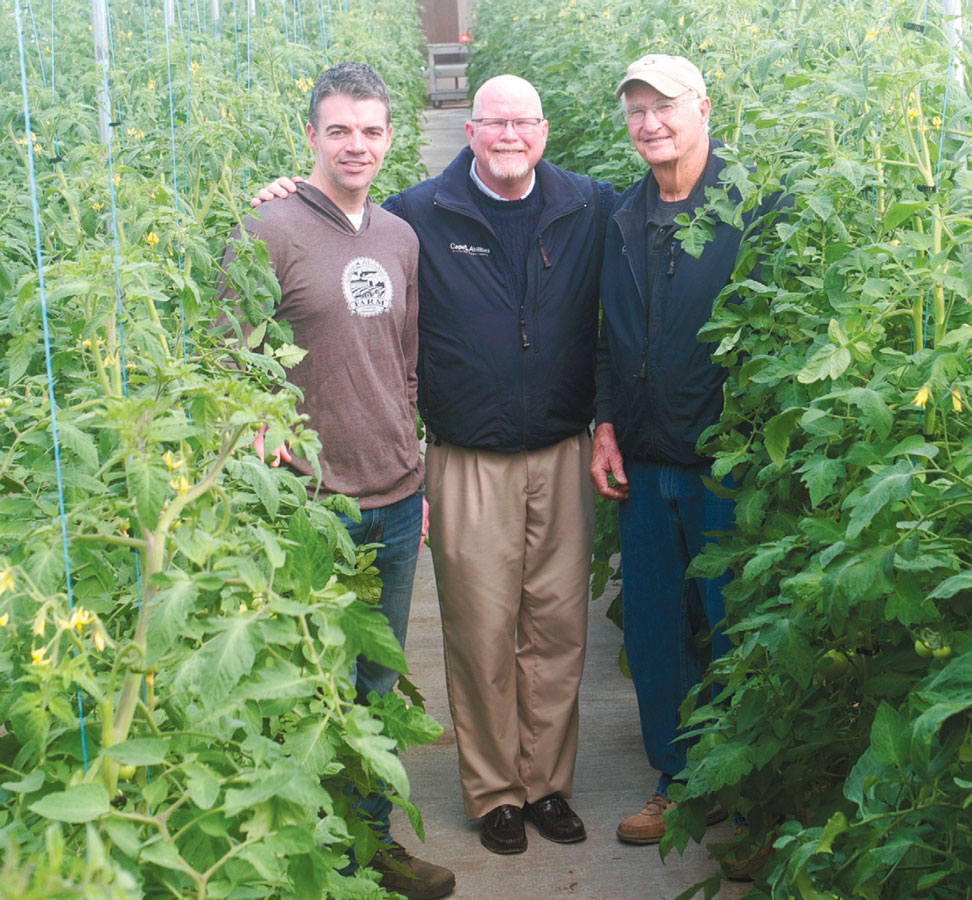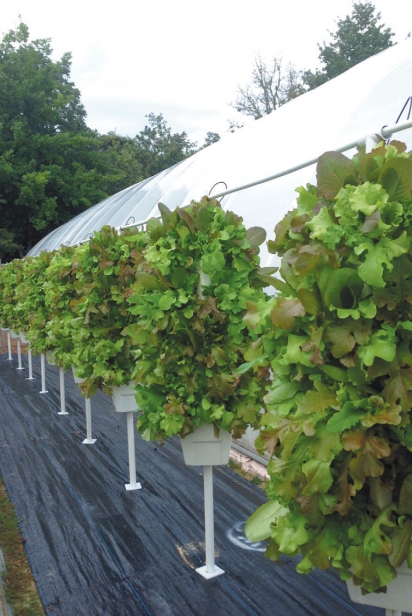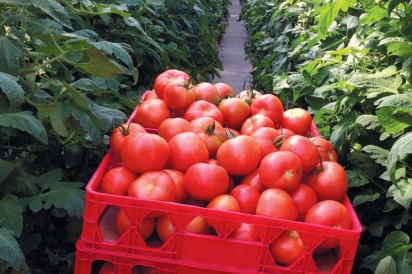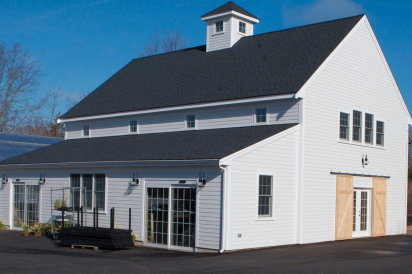Cape Abilities Farm: The Sweet Spot of Success
Cape Abilities Farm got its start in tomatoes, and the first tomato of the year is still a huge event at their Mary Dunn Road headquarters in Hyannis. Marketing Manager Troy Smith calls it the “Birth of Tomatoes”.
Smith recalls, “One month into my first year on the job, a Cape Abilities employee visited the farm and brought back to our Hyannis office the first tomato of the season. It caused a stir with all of us because it signified the official start of the season. The way he paraded it around the building made it feel to me like it was a ceremony held every year! The tomato was the size of a softball, and the employee sliced it up and shared it with everyone he came in contact with. I was fortunate enough to get a slice and it was then that I realized what the hubbub was about. These tomatoes—planted, grown and picked by our own participants—are absolutely the best tomatoes I have ever eaten.”
Cape Abilities is a nonprofit organization that provides jobs, homes and other services for people with disabilities across Cape Cod. With the creation of the farm in 2007, Cape Abilities found the sweet spot of success between local farming and job creation.
Back in 2007, Tom Zurn, Associate Executive Director of Cape Abilities, was driving around with cases of tomatoes from the fledgling hydroponic Cape Abilities Farm on Route 6A in Dennis to be tasted by restaurants, and he remembers he was met with skepticism. But today it’s different. Today people know and want the tomatoes. “It’s been tremendous,” said Zurn. Several of his early restaurant customers are still sourcing produce from the farm, including Martha Kane chef/owner of Fin in Dennis Village, who first started working with Cape Abilities when she was executive chef at Brewster Fish House; and The Naked Oyster and The Roadhouse Cafe both in Hyannis.
The Dennis farm is an entrepreneurial venture within the wider context of the Cape Abilities organization. It initially consisted of three greenhouses perching Quonset hut-like down a dirt road between Route 6A and the marsh. With innovative growing methods and the goal of employing the disabled, the Dennis farm was always a place of great potential.
“The first years at Cape Abilities Farm were a learning curve. It’s been hard work. We’ve had good luck with timing in the local food movement. We’ve worked hard at it and built momentum from the first small farmers’ markets to today. It’s a magnitude of incredible growth,” said Zurn of the years since 2007.
Today the Dennis site has a big new 1500-square-foot farm stand connected to an equally large greenhouse. It appears from the road as a bright white barn beckoning adventurous locavores with the promise of a warm welcome and a huge selection from the Dennis greenhouses, the outdoor farm Cape Abilities runs in Marstons Mills, and other vendors selling from the space.
“It’s exciting, overwhelming. We’ve gone to this huge space from a shed,” said James Barnes, Manager of the Dennis farm, as he showed off the airy new space. Barnes expects customers to spend a lot of time in the new greenhouse. At the season’s start it will be full of annuals and produce, like tomatoes, cucumbers and lettuces; herbs; vegetable starts and hanging baskets. As the season progresses the emphasis in the greenhouse will shift to vertical growing towers and flowers.
Zurn said the farm is moving towards an outside vertigrow system: six-foot-high poles with four to five attached buckets containing five plants each, meaning each pole can grow twenty plants, nourished through hydroponics. This has important implications for Cape farming as it utilizes space more effectively in tight quarters. “The area between two greenhouses is the perfect spot for vertigrow, and this year we plan to expand on the success of last year’s vertigrow in Marstons Mills,” Zurn said.
Barns explained that the yard will be filled with landscape plants, and showed the other six greenhouses now on the site that encompass a total of 1200 square feet for flower and vegetable production.
The well-known CSA (community supported agriculture program) at Cape Abilities also continues, and Barnes said that this year’s CSA has a membership 150 strong. Shares feed a family of four weekly, and cost $300 for the season that stretches from June 1 to the end of September. Weekly shares include field vegetables in season from the Marstons Mills farm, as well a constant supply of tomatoes from the Dennis greenhouse. Barnes noted how unique it is to have a constant tomato supply in a CSA and how relieving it is for members not to be subjected to whole boxes of kale when other produce is not quite ripe.
Farm stand shoppers will be also be delighted by New Englandsourced dairy and honey, and Cape-baked bread along with their flowers, produce and landscaping items.
“If we don’t produce it ourselves, we source it locally. It has to be high quality. If it can’t be found locally, it has to be sustainable. We want convenience for customers in one stop for garden and local food products,” said Barnes.
Zurn is excited because the new farm stand will allow Cape Abilities to expand their variety. “We wanted to elaborate upon our farm stand, to make it more well-rounded as a place where other vendors could sell from. We have lots of local partnerships, including Chatham Bars Inn, Eldridge Farm, Pain d’Avignon, and Underground Bakery, as well as local soap and oil producers. We want to be part of the solution for local vendors,” Zurn explained.
The farm stand will be open May 1 to December 24, 2015. Tomatoes and greens should be available straight through the open season, assuming the right weather conditions. “I just can’t wait,” said Barnes. “We want to be the sustainable source for all these things.”
In addition to the expansion in Dennis, the eight-acre Marstons Mills farm is now in its seventh year of producing outdoor crops grown by crews from Cape Abilities. The farm is situated deep in the Mills, off Race Lane near a cranberry bog. It produces cucumbers, tomatoes, eggplant, peppers, and beets, that are all for sale at the 6A farm stand. Zurn describes it as, “A therapeutic place to work,” adding that, “the growth of the individuals working there has been tremendous.”
Smith attributes a large part of their success to a growing awareness of the importance of wellness and the local wellness culture. “The environment dictates the dining culture. On Cape Cod we are surrounded by good health. The effort is remarkable,” he said.
Zurn agrees. “The ‘70s through the ‘90s were so fast and furious, but people have taken stock, and wellness has returned. We are revisiting good food and seeing wellness change in young adults. The 6A farm is part of that process. It is a treasure with all levels of healthy food for people to come and pick up. We model wellness. Our growing systems fit in with healthy goals. And we add the employment piece. Our systems are in place for success.”
The employment piece is the other key to Cape Abilities’ success. Zurn is surprised at how quickly the passion for teaching the disabled has grown. He wants to harvest that passion and share it. “The vision of the disabled has changed to one of high quality. Cape Abilities changed that,” he said.
“When people make the link between who is making the products and the product, they jump on board. They want to participate too,” added Smith.
Zurn said he is always asking what his employees want to do, and he always looking for ways to expand opportunities for the disabled. “They can try different options, such as salt making, or farming, they can find their own place. The emphasis of working to meet public demand [for product] helps with focus and finding their passion, their sense of pride. We focus on what they are good at, and that brings contentment.”
In addition to farming, Cape Abilities provides other work options for the disabled. One example is their salt works. “Four years ago Penny Lewis and Janice Burling started a salt making business called Cape Cod Saltworks. In an experimental spirit, Cape Abilities gave them space on 6A to set up eleven four-by-eight evaporation beds driven by photovoltaic fans. It worked, as the water evaporated, it revealed local salt,” Zurn said.
When Penny and Janice donated the business to Cape Abilities in the spring of 2014, Cape Abilities moved the salt beds to Meeting House road in Chatham, where an entire greenhouse is now given over to the six-day process of making salt from sea water just offshore. Now you can sprinkle your Cape Abilities tomato with local Cape Abilities salt while another group of disabled can be gainfully employed.
Zurn emphasizes the community’s readiness to include the disabled. “This is important, this group has something to give. Cape Abilities grows good citizens. Cape Abilities grows pride. In their first year Cape Abilities Farm employed four disabled adults. This year’s goal is the employment of 100 disabled adults.”
Workers from Cape Abilities Farm develop important skills they can take to jobs elsewhere. One former Cape Abilities employee is currently working at Whole Foods.
Two of the farm’s first hires are still there. One of them, Bud Hale, is a former Texas cotton farmer, and Zurn said hiring him is the best thing they did. “He’s been there every step of the way, committed to growing quality products. When people buy because it’s good, Bud made that happen.”
“In that first year it was mostly a CSA,” Barnes said, explaining that plans had existed for this expansion but were sidetracked by the economy. “The whole thing is driven by customer demand and the need to create jobs for the disabled. The improved economy has made it more possible for local business partners to help. I think we are doing something people want to support.”
No matter how big Cape Abilities Farm grows, it plans to stay true to its origins in those first tomatoes. “We always want to be known as tomato growers because that is how the whole thing started. It’s important to keep that identity,” Barnes said.
Mary Blair Petiet, a Cape Cod native, lives with her family in Barnstable.








